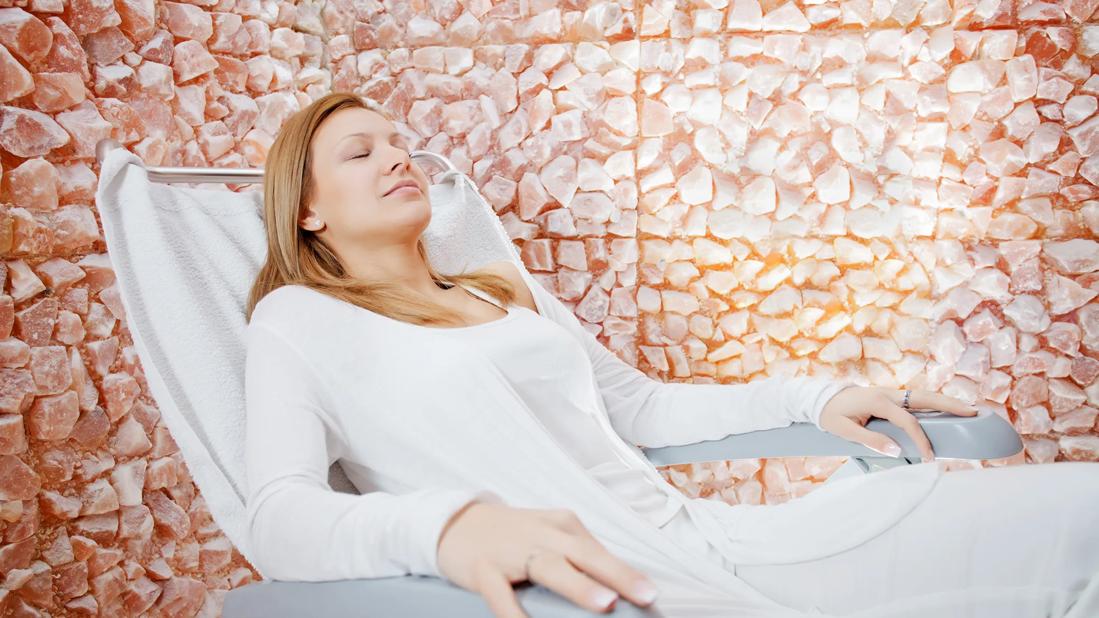Many claims lack science-backed research, but halotherapy is popular and considered safe

Belief in the potential healing power of salty air serves as the foundation for salt therapy, or halotherapy, a type of complementary medicine gaining popularity as a natural wellness treatment.
Advertisement
Cleveland Clinic is a non-profit academic medical center. Advertising on our site helps support our mission. We do not endorse non-Cleveland Clinic products or services. Policy
Therapeutic “salt rooms” or “salt caves” offer the promise of better breathing, healthier skin and stress relief. But do they deliver? Let’s find out what the science says with functional medicine specialist Melissa Young, MD.
Video content: This video is available to watch online.
View video online (https://cdnapisec.kaltura.com/p/2207941/sp/220794100/playManifest/entryId/1_u75qy6ge/flavorId/1_5f3sgelj/format/url/protocol/https/a.mp4)
Learn about the potential benefits and risks of salt therapy.
A dry salt therapy experience exposes you to microscopic salt particles in the air within an enclosed space. There are two types of therapy rooms, according to the Salt Therapy Association:
The concept of salt therapy dates back to the 1800s, when Dr. Feliks Boczkowski noticed that workers in Poland’s Wieliczka Salt Mine didn’t have lung issues like workers in other types of mines.
Search online and there’s no shortage of breathless testimonials about salt rooms. Anecdotally, people say they’re life-changing, especially when it comes to easing respiratory issues or infections.
Advertisement
When it comes to proven research, though … well, let’s just say there’s not a salt mountain of scientific evidence to support the claims.
“Sometimes, it can be frustrating that there aren’t enough well-designed studies looking at a particular treatment or the different study outcomes can be conflicting,” notes Dr. Young. “But that doesn’t mean there isn’t a potential benefit to that treatment.”
Here’s why people say they go to salt rooms.
If you have trouble moving air in and out of your lungs, odds are, your condition is on someone’s list of health issues that can be made better through halotherapy. Various sites claim salt rooms can help address:
So, how does this salty air make a difference? “Breathing in the salt particles appears to thin mucus, which allows your cough to be more productive and makes it easier to get phlegm out,” explains Dr. Young. “It gets things moving. That’s often key for people with breathing issues.”
But while studies suggest that halotherapy may be helpful for some respiratory issues, there’s not enough rigorous research with clinical trials validating the theory, she adds.
The idea of using salt to clear gunk out of your sinuses isn’t exactly groundbreaking, says Dr. Young. Saline sprays and rinses are go-to methods to rinse out your nose and sinuses for better breathing.
But does breathing in dry salt accomplish the same thing? Again, there’s not enough research to verify the claim, she adds.
Allowing salt-saturated air to flow over your body is said to naturally boost your skin’s hydration, leaving it feeling smoother and looking less splotchy. There’s a lot of chatter about balancing out pH levels and clearing up eczema, too.
Is it true? You can probably guess the answer. “There just aren’t any sound studies supporting that,” states Dr. Young.
A dimly lit salt-filled room with soft music playing certainly seems like an ideal setting for meditation. “It’s an environment where you can calm your nervous system and reduce stress,” relays Dr. Young.
But the same could be said if you took out the salt component. “You could get the same effect without it,” she says.
If you’re relatively healthy, spending a session in a salt room shouldn’t cause any issues, says Dr. Young. But she offers a few notes of caution.
Advertisement
If you have existing health issues or are pregnant, talk to your doctor before trying halotherapy to be on the safe side.
If you’re curious about salt therapy and don’t check any of the risk boxes, there’s no harm in trying it out, affirms Dr. Young. After all, salt rooms have been used by people in some form for almost 200 years.
“In general, they’re safe ― and a lot of people love using them,” she adds. “But view salt therapy as an extra to your healthcare routine and not a replacement for any existing treatment.”
Advertisement

Sign up for our Health Essentials emails for expert guidance on nutrition, fitness, sleep, skin care and more.
Learn more about our editorial process.
Advertisement

Different types of yoga poses, meditation and breathwork may help you feel more emotionally balanced

There’s very little scientific evidence that this alternative medicine practice works

Spoiler alert: Science doesn’t back the numerous health claims

This traditional Chinese medicine practice may boost mental health, immune function, balance and more

This ancient form of exercise can offer a physical and mental boost

This five-day exercise plan for beginners includes three days of resistance training, two days of cardio and two days of rest

If you don’t have an underlying condition, cold plunges might help ease sore muscles, decrease inflammation and even heighten your focus

This purple perennial has many uses, including sleep hygiene, reducing inflammation and pain, and elevating mood

Even small moments of time outdoors can help reduce stress, boost mood and restore a sense of calm

A correct prescription helps your eyes see clearly — but as natural changes occur, you may need stronger or different eyeglasses

Both are medical emergencies, but they are very distinct events with different causes